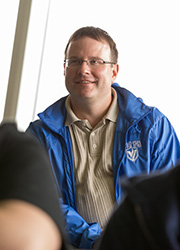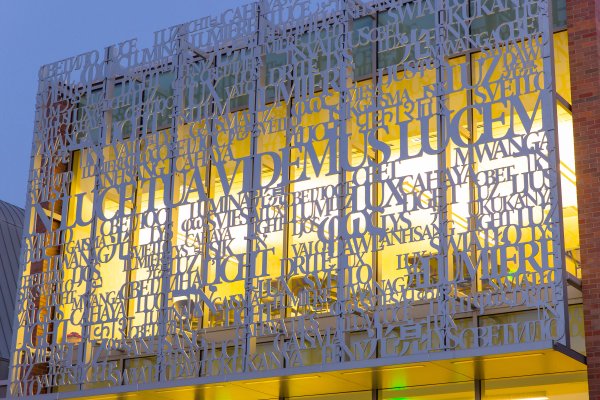Fostering Students' Success
Robert Clark, Ph.D.
Assistant Professor of Chemistry
Every week, Robert Clark, Ph.D., assistant professor of chemistry, sits down to dinner with future math and science educators.
“The dinner is for community building among the students,” Professor Clark explains. “They look forward to it every week, and it’s also energizing for me. We are like a family.”
The students at Professor Clark’s side are MSEED Scholars, participants in the Mathematics and Science Education Enrollment and Development grant program that he directs.
Professor Clark says Valpo provides exceptional support for future science educators, and the weekly dinner is one important aspect. With that support, MSEED students have developed a strong identity around their vocational plans. They established a student group, Club Educate, designed to broaden the support for all future educators — and they asked Professor Clark to be their faculty advisor.
He said yes.
“I try to view myself as a servant leader and a role model,” Professor Clark says. “I want my actions in everything I do to emphasize that ideal.”
So, in addition to meeting future educators, Professor Clark also incorporates innovations into his classes. He has “inverted” his classroom — moving away from classic chemistry lectures and instead using class time for hands-on activities. The goal is to engage students and prepare them to be life-long learners who actively seek out information.
Professor Clark also innovates in his work to recruit future science majors to Valpo. He has partnered with students to host Science Olympiad invitational tournaments on campus, where teams of middle and high school students compete in dozens of events related to science, engineering, and technology. The event brings talented science students onto Valpo’s campus, where they can see the university’s resources as well as current students’ enthusiasm for science. More than 100 Valpo students volunteer their time to present each competition.
“Students on the Science Olympiad executive committee dedicate hundreds of hours of their time,” Professor Clark says. “My goal is to mentor, advise, and connect — and to work with individuals when there are challenges.”
Eventually the group hopes to host a statewide competition, and Professor Clark has committed to helping them achieve that goal.
“For me, the overarching theme in everything I do is to foster student success. I want my passions for science and education to contribute in a worthwhile way to making the world a better place,” he says.
If that goal can be accomplished at a science competition or a club meeting or a dinner with students, Professor Clark will be there.

